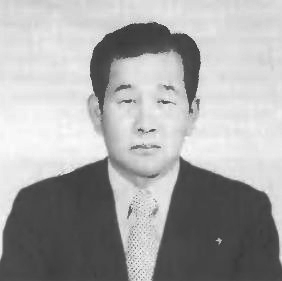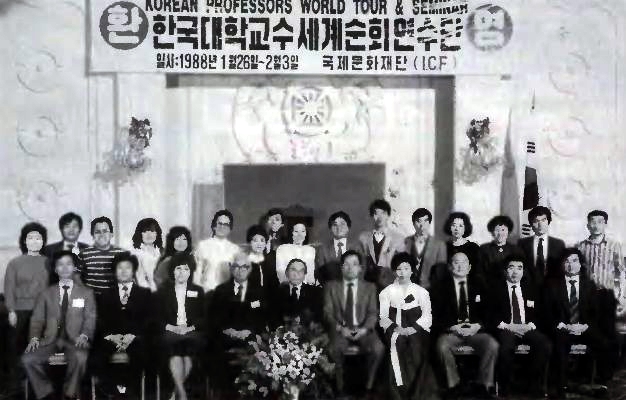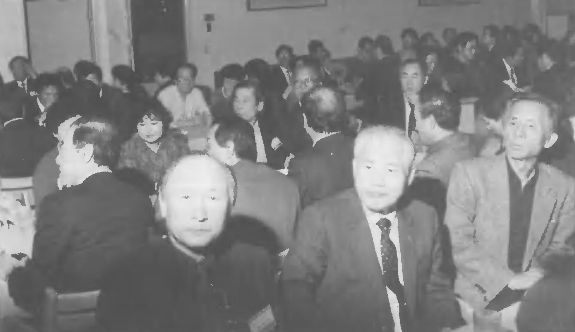![]()
The Words of the Chang Family
|
|
The Words of the Chang Family |

A
photo of Dr. Ki Kun Chang when he first began working with our
movement in Korea 20 years ago.
Since the summer of 1987, six Korean professors' tours to the United States have been conducted, with about 150 professors participating each time. Nine hundred professors have toured so far, and it is expected that about 2,000 more will have taken part by the end of the year. Dr. Ki Kun Chang participated in the sixth tour.
Dr. Ki Kun Chang has been involved with the Unification movement for 20 years. He was the first member of PWPA when it began in Korea in 1973. A professor at Sung Hwa University, he is currently vice-president of PWPA in Korea. He has been on several of the Korean professors' tours.
Question: What do you feel is the significance of these professors' tours?
I think the main significance of these tours is that they have allowed Korean scholars to comprehend the reality and the importance of the United States of America. I have heard many of them say that they realize more clearly now that the United States is the center of the world, a country that exemplifies democracy and freedom and justice. They see how America has become a highly developed nation through liberal and creative capitalism. The professors come to deeply understand that Korea must be firmly united with the United States in order to win the fight against world communism. Most Korean people believe this to some extent, but these professors have been able to verify it with their own eyes.
One of the things they see here is that the Koreans who have immigrated to the United States have become very successful in many areas of life. They see that the land of America is open to all the people of the world and that all people have a chance to succeed and become prosperous in America if they are diligent and creative.
Most of the professors who came this time have been or are now in charge of student matters in their universities, and they are very concerned about ending the anti-American agitation by leftist students, which is rampant in many universities in Korea.
Actually, I think tours to the United States such as these should be sponsored by the Korean government in order to encourage cooperation between Korea and the United States. But since neither the government nor any other individual in Korea has done this, Rev. Moon has taken the responsibility. I believe Rev. Moon is doing a great thing and is providing an unparalleled service, not only for the Korean professors, but also for Korea as a whole.

The
staff of the Korean professors tours.
Question: In Korea, what do people generally think of Rev. Moon?
Some people feel he's doing a lot of good, some are indifferent, and some people still persecute him. But gradually the number of those who are against him is decreasing. Just the fact that these professors came implies that their feelings about the Unification Church are generally positive.
Question: What kind of professors come on these tours?
The professors who have joined these tours are prominent scholars from all over Korea, from such diverse fields as the liberal arts, the social sciences, the natural sciences, and the arts. They are aware of how important it is that knowledge and technology be used for the good of the nation and world and that academic pursuits should not be used selfishly.
Since Satan rules the world with satanic knowledge and technology, scholars standing on the side of God have to take back the world through God's knowledge and technology. On the tour the professors are taught a God-centered view of life so that they can bring this knowledge to the world and counteract Satan's influence. The position of these professors is extremely important.
It is difficult for the professors to completely grasp Unification Thought in a short time. But through this tour they have been given an opportunity to see and to be touched by this way of thinking. I can see that by the end of the tour many have completely changed their conception of the Unification movement and what is possible for the world.

The
Korean professors at a restaurant in Los Angeles.
Question: How do the professors feel about Rev. Moon's idea to unite North and South Korea?
I believe they think Rev. Moon's idea to unite North and South Korea is quite possible. Having heard many lectures regarding Rev. Moon's thought on this urgent matter, they have all signed a pledge and promised that they will participate in the movement for the unification of Korea. The professors have also pledged to take responsibility for the quality of education in the community schools. The Unification movement has established 70 community schools to educate poor children and youths in rural areas. I have been asked to be responsible for all the community schools. The government schools do not provide enough quality or moral education. These community schools educate people in values and responsibility; I believe these schools will create a revolution in education.
Question: What does Rev. Moon see as the role of scholars in the unification of Korea?
In order for a human being to function as a whole, the three areas of a person -- brain, heart, and body -- must work together harmoniously. Likewise, human society should be organized based on the harmony among these three elements -- wisdom, love of God, and justice. Scholars represent wisdom and knowledge, that is, head and brain. The church represents the love of God, which is heart and mind. And the struggle over communism represents justice, or hand and body. When these three elements come together in harmony in one nation, we can create God's country.
The professors understand clearly that the Unification movement in Korea is firmly dedicated to the ideals of Victory Over Communism and the establishment of one ideal world under Godism. Thus, for the unification of the North and South we need the harmony of these three elements. Wisdom is being cultivated by the professors' movements such as PWPA, the Unification Church activities represent the heart, and justice is being promoted by VOC activities. In the Unification movement in Korea, these three elements are being harmonized, and the professors are taking their part in this by speaking out to the public and by verifying the ideals of Unificationism through their research.
Up to now, Unification church members and VOC members have spoken to the public, but there has been a fairly limited response. Now, however, as these professors come back to Korea after their tour and speak in public about what Rev. Moon is accomplishing all over the world, they are being seriously listened to. They are telling their colleagues, their neighbors and relatives, and their students about what they have learned here, and gradually their influence is starting to be felt all over the country. Scholars are highly regarded in Korea. People feel that scholars would never tell a lie or make propaganda. The professor's obvious devotion to Rev. Moon's ideal for the sake of the peace of the world is greatly respected. The response of the public to these professors has so far been excellent.